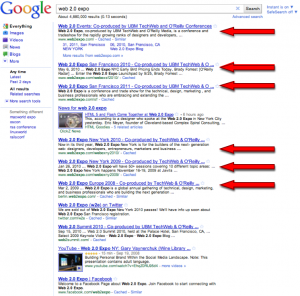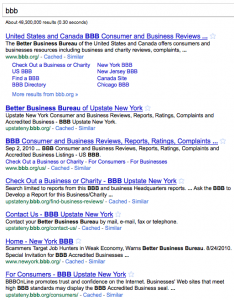Setting client expectations for online reputation management can be tough. No two clients are exactly alike even if their situations appear to be very similar. Some clients can see their problem disappear in two weeks and others can be as frustratingly difficult to outrank as [pay day loans] or [mesothelioma]. This means I’m constantly on the lookout for new ways to improve the results for our ORM clients and Google gave me some hope on August 20th when they announced that they were now showing more search results from a single domain.
As Barry Schwartz and Andy Beal were quick to point out, this should be an obvious win for the ORM industry. Everyone in the community let out a “woohoo!” and we watched as SEOs competing for branded terms demanded change when their rankings dropped from #3 to #9.
Like everyone else I loved the idea of indexing multiple pages from a single domain. It would solve the problem of us recommending clients split their attention and back links between the main site and optimized sub domains or micro-sites. I could keep both my SEO and ORM hats on without giving counterintuitive advice. The only problem would be figuring out how to get more results for one domain.
When Malcolm Coles first discovered the update there was some conversation surrounding how these results were being generated. Buessery and Bill Slawski both saw the results as a new query display for entity pages. On Search Engine Land Stephan Spencer asserted that Google was displaying the “host crowded” listings broken out at the top of the SERPs rather than indented and hidden as “more results from [domain.com] >>.” One thing is absolutely certain, only a few branded searches and domains have been “gifted” with more search results.
It wasn’t until I was prepping for my Web 2.0 Expo SEO/SMO 101 presentation in New York on Sunday that I even saw a more search results query in real life for [web 2.0 expo] and it was a biggie:
I started checking the other conferences and it looked like many had similar results including [search engine strategies], [search marketing expo], [pubcon] and [sxsw]. Branching outside of conferences I found the same more results appearing for related associations like [sempo] and non-industry associations like [american cancer society]. Google suggested in their post on the update that exhibitions at museums were a perfect example of a site meriting more search results. Sure enough the [metropolitan museum of art] and even the [national zoo] have more results. I checked universities next, but couldn’t find one with more results even though these seem like they would be a perfect fit as well. Most of the universities had a significant amount of sub domains and other domains broken out in the top 10 results though, which leads me to the question of when do these results appear?
More Results Correspond with Average Monthly Search Volume
The more results appear to have a direct correlation with the average monthly search volume of each given query. The more a user searches for a single query, but navigates to different pages (e.g. exhibits or new conference dates) the more likely those pages are to appear. One important consideration is that the more results do not always mimic the site links for a domain. If to Bill’s point these pages are host crowded results for entity domains, which have historically been limited to showing no more than two results per domain, then in order to make your site appear with more results you would need to have the same characteristics of these entity domains.
Traffic and back links still matter. When I looked at the global monthly search volumes for the corresponding query, the pages that got the most traffic were almost always the pages that appeared in the more results (exceptions discussed below). Why do those pages get more traffic? They meet user intent, they’re trusted and they have a lot of back links or in some situations were on the receiving end of a 301 redirect from an old page with a ton of links.
We still have to do the work! Just like building links to a sub domain, it will still take time to send enough links and generate enough traffic on these individual pages for a particular query to produce more results. Even then, does this domain qualify as an “entity”?
Some interesting observations with regards to the more search results:
More Results Can Be Personalized
When I searched for [bbb], I got the main bbb.org domain as well as several for upstateny.bbb.org specific to my location:
More Results Vary for Brand + Modifier
Do a search for [search engine strategies san jose] or [apple ipod] and you’ll get a different set of results from the main brand:
More Results Don’t Always Meet User Intent
When I did a search for [search engine land] Google returned a big list of blog posts rather than the main categories. Does this really meet user intent?
More Results, Query Deserves Freshness and Social Indicators
Continuing with the [search engine land] results, QDF indicators have to be getting factored into the More Results while social indicators don’t appear to play a huge role. Honestly, I don’t know why some of these posts are appearing for different blog brands and would love to hear your theories, so post ’em up in the comments!
Meanwhile, let’s get back to work because this isn’t a fast win for ORM unless you’re already wielding a big entity-marked brand.





